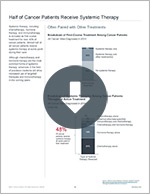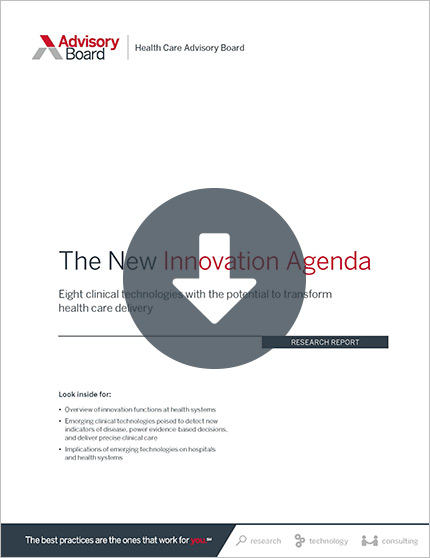Auto logout in seconds.
Continue LogoutHealth systems, cancer centers, and other providers are collaborating to create networks intended to make it easier for pharmaceutical companies to use their facilities—and patients—to conduct clinical trials, Jared Hopkins reports for Bloomberg.
Drugmakers can spend years seeking patients for trials
Pharmaceutical companies can spend years recruiting the appropriate patients for clinical trials, which are designed to test the safety and effectiveness of experimental treatments, Bloomberg reports.
According to Bloomberg, drugmakers often have difficulty finding patients to participate in clinical trials. The Cancer Research Institute estimates that just 3% to 6% of cancer patients eligible to participate in clinical trials end up enrolling in the studies.
Before a clinical trial can begin, drugmakers also are required to receive approval an Institutional Review Boards (IRB), which are intended to protect patients' rights and safety. But depending on the design of the trial, a drugmaker might need to get approval from several different IRBs. For instance, if a drugmaker is seeking to perform a clinical trial at 40 hospitals, they could be required to get signoff from as many as 40 different IRBs.
As such, pharmaceutical companies tend to choose large hospitals to conduct clinical trials because they would be subject to fewer IBR reviews and have access to larger patient bases.
How providers are trying to ease the process
But some providers are working to give drugmakers a different option for overcoming clinical trial hurdles.
Hospitals, health systems, and other providers are beginning to band together to form organizations that can serve as a main point of contact for pharmaceutical companies looking to conduct clinical trials at the group's facilities. Such arrangements, Bloomberg reports, are subject to only one IRB review, as opposed to the standard process of getting one from each participating provider.
According to Bloomberg, Geisinger Health and five other health systems in New Jersey and Pennsylvania have established such a consortium.
James Brazeal, Geisinger's chief administrative research officer, explained, "As a group we're stronger than just one. We're able to leverage that so we have more of an ability to participate [in clinical trials], so that we can attract some of the trials that we couldn't attract before." Geisinger Health's consortium, which will directly negotiate with drugmakers on behalf of the health systems, aims to direct 20% of clinical trials conducted at the health systems over the next year.
In addition, more than 1,400 cancer physicians came together to create the US Oncology Network, a unit of drug wholesaler McKesson, which helped Johnson & Johnson with the clinical trial enrollment process for the company's myeloma drug Imbruvica.
Jeff Sharman, a hematologist at Willamette Valley Cancer Institute and a medical director of hematology research for the US Oncology Network, said the network was able to help recruit and enroll patients in the Johnson & Johnson clinical trial in less than half the time it would have taken the drug company on its own.
In another example, Sanford Health, which operates 45 rural facilities in North Dakota, is partnering with others to host 300 clinical trials. David Pearce, who directs Sanford's research, said Sanford's involvement in clinical trials helps drugmakers and patients.
Consortiums could help make trials more profitable for providers
According to Guidestar Research, which helps hospitals conduct clinical trials, centralizing the clinical trial enrollment process across hospitals also can make participating in trials more profitable for smaller providers.
According to the Halloran Consulting Group, drugmakers can pay hospitals more than $10,000 per participant. Sean Walsh, managing partner at Guidestar Research, said, "We go to the hospital and can say, 'Hey there is a clinical trial sponsored by X pharmaceutical company that can help patients bring a new drug to treatment and can also help you with your bottom line and offset some losses in other areas'" (Hopkins, Bloomberg, 10/29).
Learn more about why study design matters
Been awhile since your last statistics class? It can be difficult to judge the quality of studies, the significance of data, or the importance of new findings when you don't know the basics.
Download our cheat sheets to get a quick, one-page refresher on some of the foundational components of evidence-based medicine.
Don't miss out on the latest Advisory Board insights
Create your free account to access 1 resource, including the latest research and webinars.
Want access without creating an account?
You have 1 free members-only resource remaining this month.
1 free members-only resources remaining
1 free members-only resources remaining
You've reached your limit of free insights
Become a member to access all of Advisory Board's resources, events, and experts
Never miss out on the latest innovative health care content tailored to you.
Benefits include:
You've reached your limit of free insights
Become a member to access all of Advisory Board's resources, events, and experts
Never miss out on the latest innovative health care content tailored to you.
Benefits include:
This content is available through your Curated Research partnership with Advisory Board. Click on ‘view this resource’ to read the full piece
Email ask@advisory.com to learn more
Click on ‘Become a Member’ to learn about the benefits of a Full-Access partnership with Advisory Board
Never miss out on the latest innovative health care content tailored to you.
Benefits Include:
This is for members only. Learn more.
Click on ‘Become a Member’ to learn about the benefits of a Full-Access partnership with Advisory Board
Never miss out on the latest innovative health care content tailored to you.


